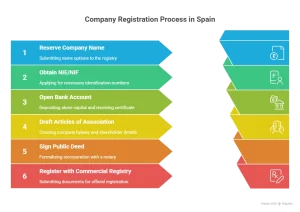Entrepreneurs from all over the world have been eyeing Spain. And not just eyeing, they are setting up their entire businesses here too.
There’s a lot the country offers: an easier access to the European Union market, rich local culture and an increasing number of startups that has been showing no signs of slowing down anytime soon.
But there is a lot that goes into setting up a company in Spain. That’s why our today’s blog post explains the entire process, covers all the important legal structures, registration, costs, hiring, and major pitfalls.
This roadmap here is to help you make informed decision, so your business journey in Spain starts off on the right foot!
Why Should You Start Your Company in Spain?
So what makes Spain an ideal place for company formation? Why is it even considered a magnet for international entrepreneurs and investors? We discuss that and more:
What are the Advantages of Starting a Business in Spain?
Honestly, there are a lot of benefits for new businesses opening up their shops here. You gain access to more than 450 million consumers across Europe. If you are considering hiring, the talent pool is vast with high skilled workers.
Backed by investors, Barcelona or Madrid are among some of the internationally recognized cities for tech, biotech, and other creative startups, offering incubators and accelerators.

Plus, national and regional grants, tax incentives, and dedicated startup laws simplify the process of starting your company in Spain.
There’s also the prospect of a higher quality of life with some of the best healthcare and education programs out there. And the cost of living here is significantly lower than, say, northern Europe. Talk about winning on all fronts!
What are the Major Challenges in Company Formation?
Some of these struggles are all too prevalent among the foreign entrepreneurs. Language barrier is among the most common ones. Seeing as most of the official processes exist only in Spanish.
Another one is bureaucracy, known for being quite paper-heavy and notoriously slow. Tax system complexities also pose a huge challenge to international investors.
How Can You Overcome These Struggles?
While setting up your company in Spain means coming across various hurdles, those are easy to overcome if you have got the right service provider on your side. Thorough guidance and support goes a long way.
- Partnering up with a bilingual legal counsel can effectively solve the problem of language barriers with paperwork.
- Hire a gestor for efficiency and get a digital certificate for online procedures to win against bureaucracy.
- Consult a tax advisor early in the setup process to help you out with the tax system’s complexities and nuances.
Grow in Spain Without a Local Entity – EOR Solutions That Work
How to Register a Company in Spain: Legal Business Structures You Can Choose From
The first biggest step in registering your company is choosing the right legal structure. Which structure you choose would affect taxes, liability and your ease with doing business.

If you have been planning on operating without a physical entity, work with a reliable professional employer organization in Spain to simplify the whole process.
These are the legal business structures you can choose from:
1. Sole Trader (Autónomo)
- This structure is best for freelancers and solo entrepreneurs
- The tax filings are easier with this structure
- Fewer protections are offered with this legal business structure
With sole trader as your business structure, you run the higher risk of unlimited personal liability for business debts. Your personal assets are on the line.
2. Limited Liability Company
- LLCs are most commonly used by SMEs and startups
- They require a minimum capital of €3,000
- Shareholders’ liability is limited to their investment
- As a business structure, LLCs are more flexible in terms of ownership
- This business structure is scalable for future expansion
Other Types:
There are other types of business structures, as well.
Public Limited Company:
- For large enterprises that are planning to go public or raise capital, public limited companies are an ideal business structure.
- This type of business structure is for larger ventures that have a higher capital than 60k Euros
- The business structure is accompanied with a stricter level of governance
Cooperatives:
- Cooperatives are owned and managed by members who share profits equally
- This business structure is best for ventures that are community-driven
Partnerships:
- This business structure is less common for standard foreign setups
- It is suited for specific collaborative models.
- Liabilities are shared among the partners
Managing employees makes things complex all around. Partner with a reliable professional employer organization for payroll, compliance, and HR in Spain.
PEO Services in Spain – Compliance, Payroll & HR Made Simple
How to Register Your Company in Spain: A Step-by-Step Guide

Here is how you can register your company in Spain:
Step 1 – Verify and Reserve Your Company Name
The very first step is reserving your company name. For this, submit a formal request to the Central Mercantile Registry. You should provide 3 to 5 name options.
Serialize them according to your level of preference. Your company’ name availability will be confirmed when you receive a certificate.
Step 2 – Get a NIE/NIF Number
The next step is to get your NIE and NIF number. An NIE is required for all foreigners. An NIF, on the other hand, is for legal entities. You can apply for these at a Spanish consulate in your home country or at the local police station in Spain.
Step 3 – Open a Business Bank Account
Now, it’s time for you to open a business bank account in the company’s name. Deposit the minimum share capital. You will receive a bank certificate, confirming your deposit.
Step 4 – Draft the Articles of Association
Onto the next steps, you will draft the AoA. The details on there will include your company bylaws, shareholder information, and business activity.
Your documents should match your intended business structure. For ensuring accuracy and compliance and preventing any future disputes, collaborate with a corporate lawyer.
Step 5 – Sign the Public Deed Before a Notary
Onto the next step is signing the Public Deed. All the founding shareholders or legal representatives who hold the power of attorney need to appear before a Spanish Notary Public.
The Notary formalizes the company’s incorporation by signing the Public Deed which includes the Articles of Association and the bank deposit certificate.
Step 6 – Register with the Commercial Registry
Now that the company has been formalized, submit the notarized Deed, NIF application, company name certificate, and bank deposit certificate to the local Commercial Registry.
You will receive your official CIF (company tax ID) and legal registration upon approval, that typically takes 1 to 2 weeks.
Step 7 – Register for Taxes & Social Security
The last steps include registering your company with AEAT, signing up for corporate tax and VAT in Spain.
If you will be hiring employees, you have to enroll with the social security system.
Company Formation in Spain: Costs Estimation & Timeline
For an EU destination, setting up a company in Spain is fairly priced. But what does the cost and timeline estimation look like? It varies for everyone, depending on which structure you choose and how long all the documentation takes for you.
Formation Costs Breakdown:
We have broken down the formation costs for sole trader business structure as an example:
- Minimum capital of €3,000
- Notary Fees: €100 – €300 for deed formalization
- Commercial Registry Fees: ~€200 – €250
- Legal/Accounting Support: €500 – €2,000+, highly recommended, and cost varies significantly
- Minimum Share Capital: €3,000, deposited in the bank and remains company funds
- Additional expenses: Potential translation costs, certificate fees, bank charges.
Typical Timeline
Here’s a glimpse at the expected timeline:
- 1 to 3 working days for name reservation
- 2 to 5 working days for notary and deed signing
- 7 to 15 working days for registry processing
- Roughly 3 to 4 weeks for total setup, assuming all paperwork is done
The Basics to Hiring Employees and Employment Law
After opening your company in Spain, the next phase is hiring employees and growing your team. You need to be aware of employee rights and Spain labor laws before you start recruiting.
Employee Contracts & Types:
The employment contracts should clearly state the role, duration, salary, working hours, and termination conditions.
Indefinite, fixed term and part time contracts are among the types of employment contracts.
Social Security and Payroll Setup:
- You should register each employee with social security before they start.
- Calculate and withhold income tax (IRPF) and Social Security contributions from salaries.
- Pay employer social security contributions
- Submit detailed monthly payroll reports and payments
Consider using Payroll Services in Spain, whether through reliable payroll software or by partnering with a trusted local provider, to ensure accuracy.
Remote Work & Labor Rights:
The rules in Spain are employee-friendly. They are governed by Royal Decree-Law 28/2020 that requires a written agreement covering equipment, expenses, working hours, right to disconnect, expense reimbursement, and digital privacy, and data protection.
An employer of record in Spain can handle hiring and compliance on your behalf.
Common Mistakes to Avoid When Setting up A Company in Spain
Don’t Let Easily Avoidable Errors Stall Your Business Dreams! Below, We Share Some Frequent Pitfalls Along with How You Can Steer Clear of Those.

Not Choosing the Right Legal Structure
Selecting the Wrong Business Structure Will only Lead to Tax Inefficiencies or Limited Growth Potential. for Most Startups, Sole Trader Is the Safest and Most Flexible Option Among All the Legal Structures.
Incomplete or Incorrect Paperwork
The Entire Process Can Be Thrown Off Its Schedule Due to Missing Documents or Errors in Paperwork. Always Double Check Your Forms. Let a Professional Peo Service manage These on Your Behalf.
Ignoring Tax/accounting Obligations
Not Filing Monthly Vat, Quarterly Tax Returns, or Year-End Declarations Are the Fastest Way to Invite Steep Fines. so Set up A Reliable Accounting Process from Day One.
Your HR Partner in Spain – Hassle-Free, Compliant, Reliable
Conclusion: Start Your Company in Spain with Confidence
Setting up A Company in Spain Is Not the Simplest of Feats. but It Is Absolutely Doable with The Right Guidance. from Eu Market Access to A Vibrant Lifestyle, Spain Has Plenty to Offer Ambitious Entrepreneurs Like You.
Launch Your Business Venture Today! Need a Local Service Provider to Guide You Through the Legal, Tax, and Hiring Details? Iberia Eor can Be Your Trusted Partner for Company Formation in Spain and Full Compliance Support.
Faq’s: Company Registration in Spain
Can Foreign Entrepreneurs Start a Company in Spain?
Absolutely! Non-Resident Foreigners Can Set up And Own Spanish Companies.
What Is the Minimum Capital Required for A Spanish Sl?
You Need a Minimum of €3,000 in Share Capital.
How Long Does It Take to Register a Company in Spain?
Typically 2 to 3 Weeks if Your Documents Are in Order.
Do I Need to Be in Spain to Register My Company?
No, you can register remotely by granting Power of Attorney to a local representative.






